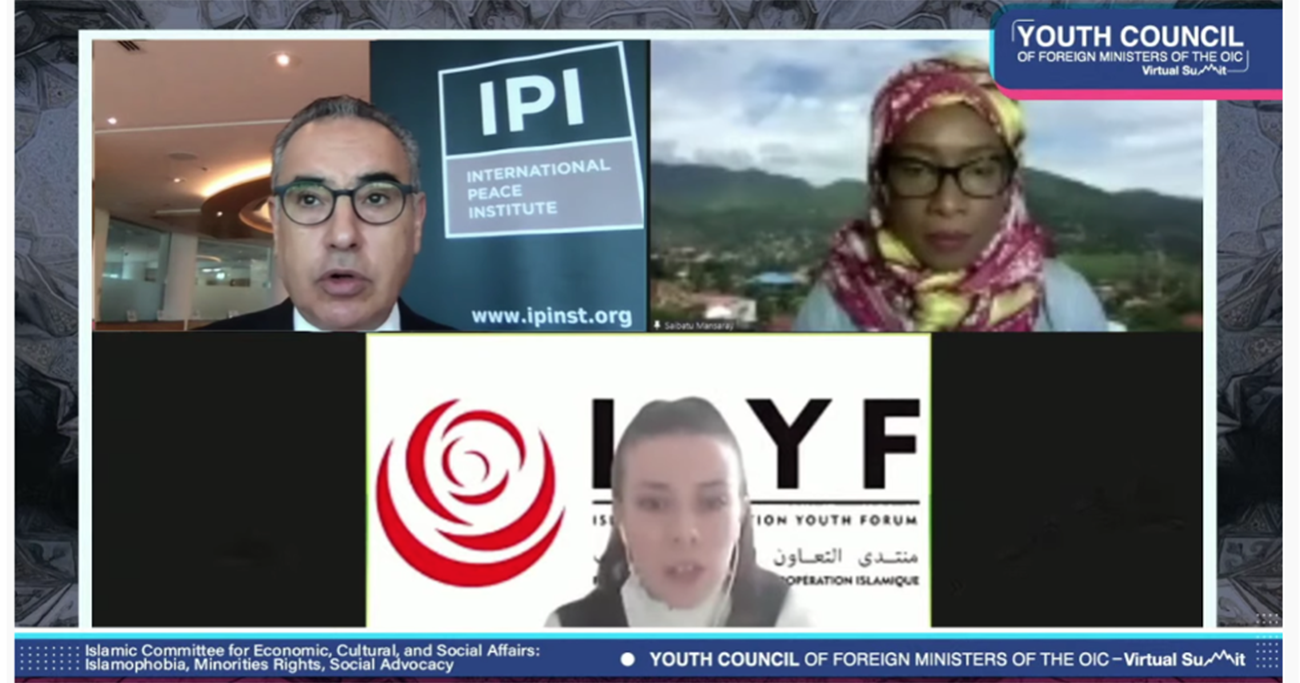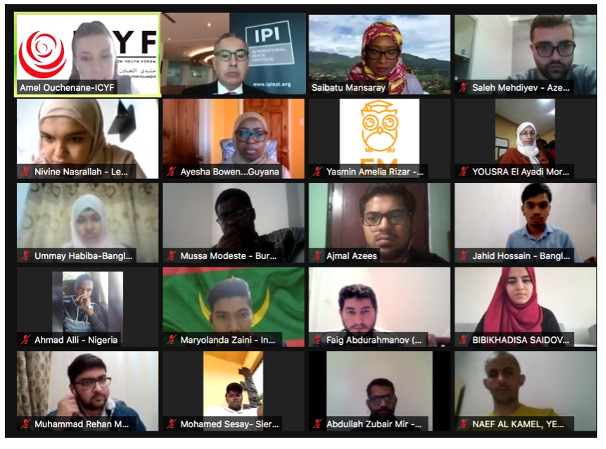
From left: Mr. Nejib Friji, IPI MENA Director, Ms. Saibatu Mansaray, Former US Assistant Director for Public Health with Ms. Amel Ouchenane (moderator).

During a webinar hosted by the Islamic Cooperation Youth Forum (ICYF) on November 25th, an international organization affiliated to the Organization of Islamic Cooperation (OIC), IPI MENA Director Nejib Friji called for greater preventive approaches and measures to build community resilience to intolerance, religious discrimination and hate speech.
Addressing an audience comprising of over 100 youth from 52 countries at the ICYF’s Youth Council of Foreign Ministers 2020 Virtual Summit’s fourth session, entitled “Islamic Committee for Economic, Cultural & Social Affairs: Islamophobia, Minorities Rights, Social Advocacy,” Mr. Friji stressed the importance of engaging in intergenerational dialogue with the youth on such issues as the key stakeholders of our collective futures.
“Instead of reactive strategies, it is our responsibility to support proactive preventive measures for a future that encompasses tolerance, sustainability, and peace,” he stressed. He emphasized the role of education in equipping the youth with the skills and values needed to foster a sense of global citizenship, universal principles of responsibility, accountability, and cultural understanding to counter negative misconceptions and combat prejudices and hate speech.
Emphasizing that freedom of expression should not lead to tolerating hate speech or exclusionism, he pointed to public policies as key in this respect. “Government-led initiatives must use a succinct language of tolerance and respect that avoids ‘othering’ of any community,” he stated.
He also referred to the media’s influential reach and capacity as a tool to aid social advocacy in tackling cyberbullying, hate speech, and prejudices.
“Media is an integral part of the lives of entire family units, but particularly for youths today,” he stated. “They are the generation who grew up alongside the digital era. Cultural and creative communities must use this space wisely to explore a culture of peace and tolerance within future generations.”
Parallel to education and social media as preventive tools to counter discrimination are religious leaders, civil society, and communities. Mr. Friji stressed the need to engage in productive dialogue with religious and community leaders in their capacity to build awareness, tolerance, and cooperation within their societies.
“The global community holds the tools necessary to foster tolerance and sow the seeds of a culture of peace,” he concluded. “We must all lead by example. This can only be achieved through multilateral effort and cooperation to emerge stronger as a global community that is well poised to achieve durable peace and sustainable development.”
Panelist Ms. Saibatu Mansaray, former US Assistant Director for Public Health, also encouraged youth to engage in mutual respect and understanding to ensure cooperation between all societies and communities.
“We must promote the knowledge of different minorities, cultures, and their languages,” she stressed. “Protected rights of minorities can promote an inclusive, peaceful, and cohesive society which is vital to security, sustainable development, and peace.”
She called for greater interfaith etiquette, religious competence, and tolerance, particularly during times of crises and upheaval, to prevent misconceptions and judgments, along with increased participation of women.
“Women, you have a voice and we need to hear it,” she stressed. “You have a seat at the table, do not wait for an invitation.”
She concluded by emphasizing that all youth have a role to play in improving their societies, communities, and countries. “You are leading the charge on change. If we don’t improve our countries and communities, who will?”
The panel was followed by a question and answer session with youth participants from Pakistan, Nigeria, Tunisia, Bangladesh, Sri Lanka, Liberia, and other countries on the importance of being an agent of change to tackle discrimination and ensuring that peace becomes a global priority.







